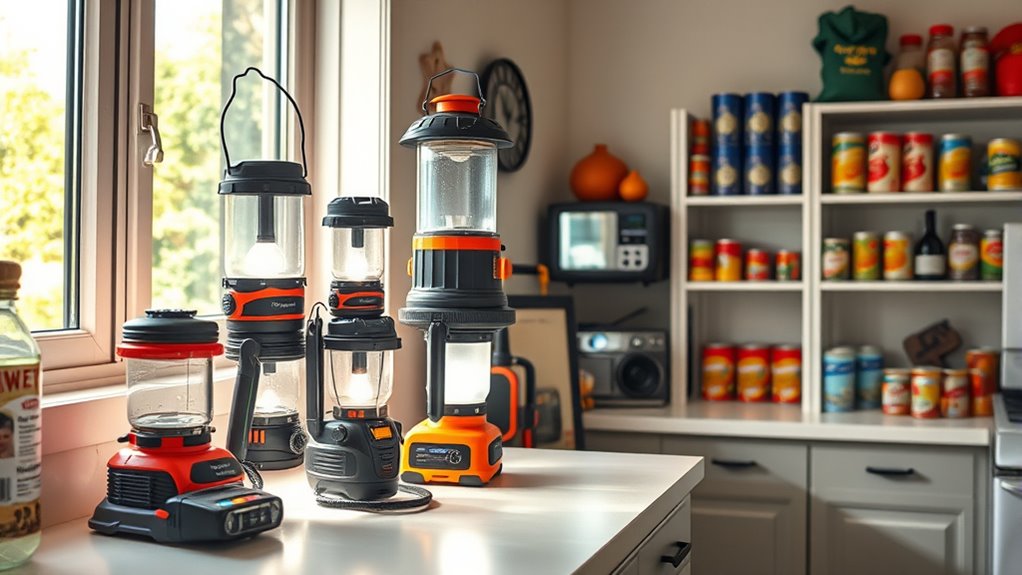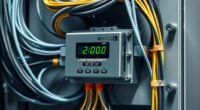To set yourself up for success during a first power outage, start by checking and organizing your emergency supplies—batteries, flashlights, water, and non-perishable food. Create a safety and communication plan with backup contacts and methods. Protect essential items like medications and food, and test your generator if you have one. Also, verify your home’s electrical system is in good shape to prevent future outages. Keep these strategies in mind as you prepare for whatever’s ahead.
Key Takeaways
- Test and stock up on batteries, flashlights, and portable chargers; organize supplies in a cool, dry location.
- Create a communication plan with designated contacts and multiple methods like texts, social media, and radio.
- Maintain and test your generator; store bottled water and non-perishable food safely for quick access.
- Schedule routine generator maintenance and ensure essential appliances can operate efficiently during outages.
- Regularly inspect electrical systems, upgrade wiring if needed, and plan backup power solutions for critical devices.
Assessing Your Emergency Kit and Supplies
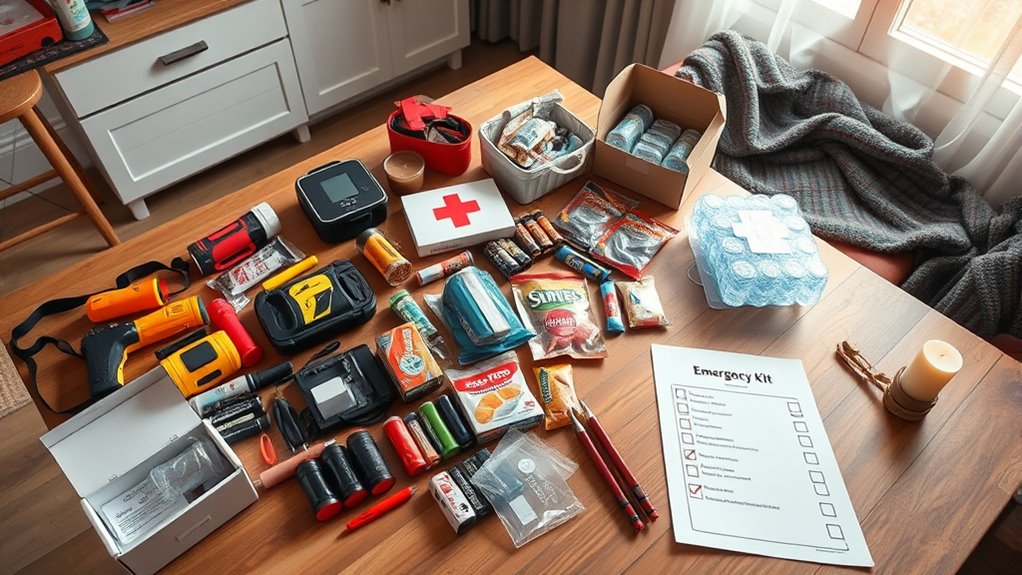
Before a power outage occurs, it’s essential to evaluate your emergency kit and supplies to guarantee you’re prepared. Start by checking your batteries—perform battery maintenance by testing them and replacing any that are weak or expired. Proper supply storage is vital; ensure your supplies are organized, accessible, and stored in a cool, dry place. Verify that you have adequate flashlights, batteries, and portable chargers ready to go. Refresh your first aid kit, and confirm your water and non-perishable food supplies are stocked and within their expiration dates. Keeping your emergency kit updated and well-maintained ensures you won’t waste precious time during an outage. Regular assessments help you identify shortages or outdated items, making sure you’re fully prepared when the lights go out. Incorporating essential oils for stress relief can also help maintain calmness and clarity during stressful emergency situations.
Creating a Safety and Communication Plan
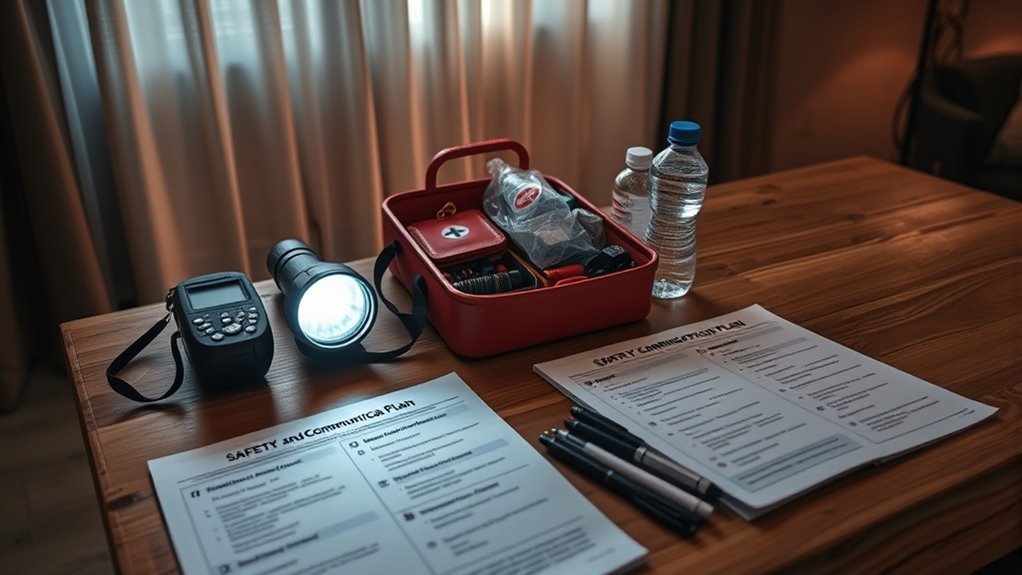
Having a clear safety and communication plan is essential to staying informed and connected during a power outage. You need to understand generator safety to prevent accidents, such as carbon monoxide poisoning or fire hazards. Developing effective communication strategies makes certain everyone stays updated and safe. Consider these key points:
- Designate a primary and backup contact person outside your household.
- Use multiple methods, like text messages, social media, or battery-powered radios, to stay informed.
- Keep emergency numbers handy, and ensure all family members know how to operate communication devices.
- Familiarize yourself with power outage preparedness guidelines to better respond and recover.
Protecting Food, Water, and Essential Items
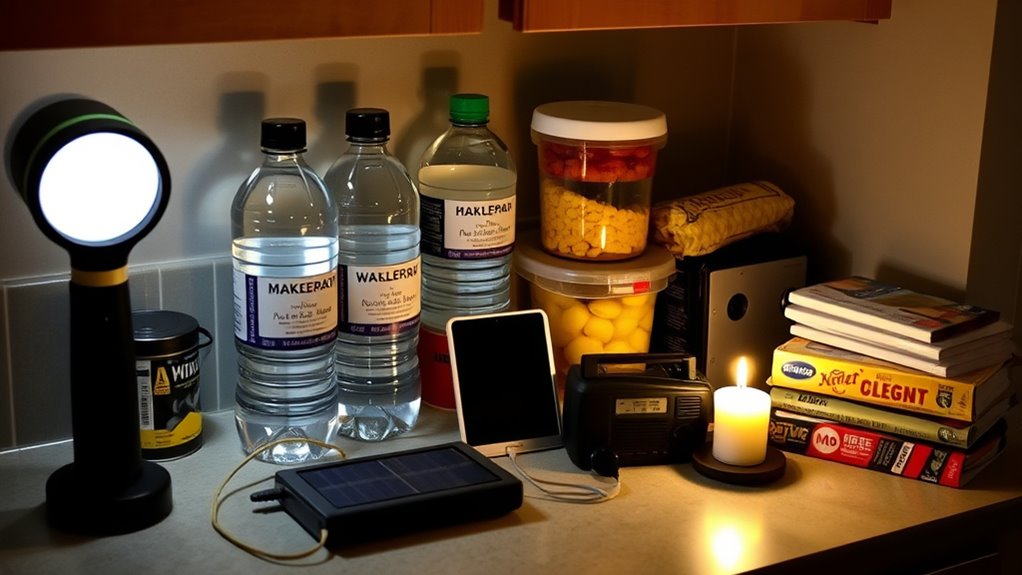
During a power outage, protecting your food, water, and essential items is crucial to prevent spoilage, contamination, and shortages. Make certain your generator is well-maintained and ready to run, as a reliable power source can keep your perishables cold and your water supply safe. Use alternative lighting like battery-powered flashlights or lanterns instead of candles to reduce fire risk and maintain visibility. Keep a supply of ice or frozen gel packs to help preserve food if the outage lasts longer than expected. Store bottled water in a cool, dark place, and seal any open food containers tightly. Prioritize critical medications and supplies, and keep them accessible. Practicing organized storage can help you quickly locate necessary items during emergencies. Taking these steps helps safeguard your resources and minimizes disruptions during the outage.
Managing Home Comfort and Power Needs
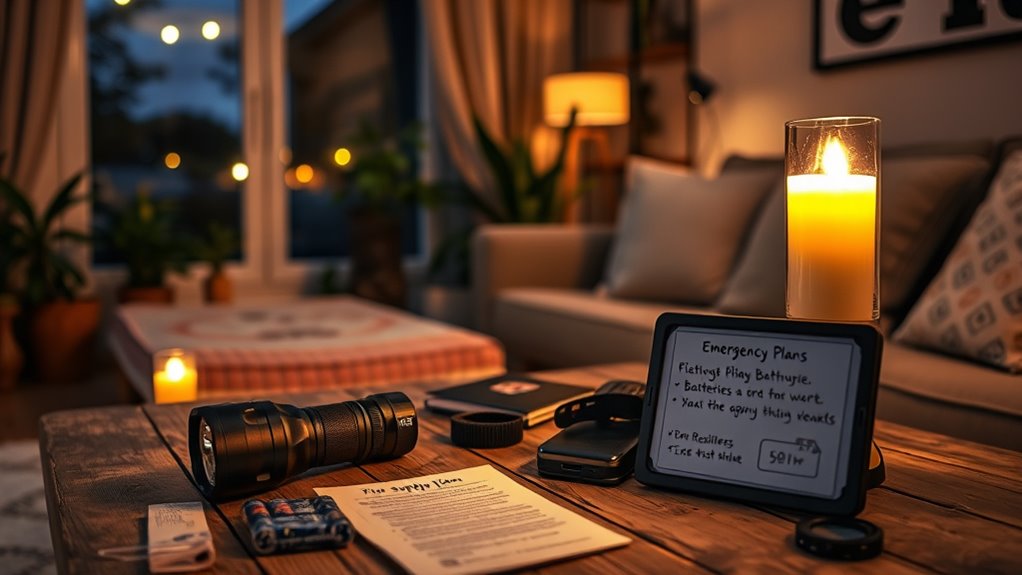
Managing your home’s comfort and power needs during an outage requires proactive planning. Regular generator maintenance guarantees your backup power source is ready when needed, preventing surprises during an emergency. Consider blackout insurance as part of your preparedness, giving you peace of mind and financial protection. To optimize your comfort, keep essential appliances like heaters, fans, and lights functioning efficiently. Incorporating proper ventilation considerations can also help maintain safe indoor air quality during extended outages. Some key steps include: – Scheduling routine generator maintenance to ensure reliability – Investing in blackout insurance for added security – Stockpiling batteries and portable chargers for essential devices
Recovering and Preventing Future Outages
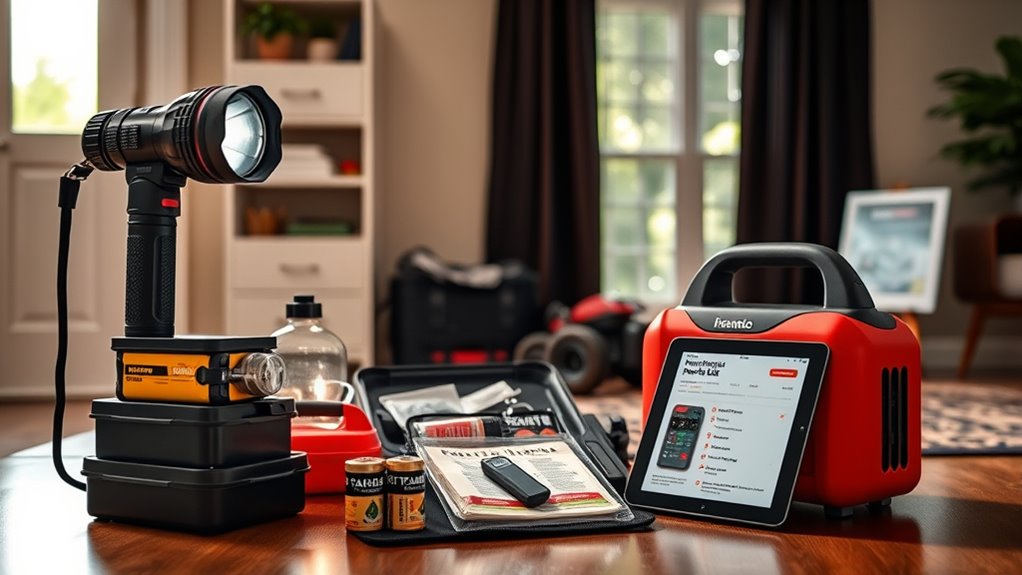
To recover quickly from a power outage and reduce the risk of future disruptions, it’s vital to identify the cause and address underlying issues. Begin by inspecting your electrical system and consulting with a professional if needed. Regular generator maintenance ensures your backup power source is ready when you need it, preventing failures during outages. Test your generator periodically, change filters, and check fuel levels to keep it reliable. Installing a backup power system can help maintain essential appliances and prevent prolonged outages. Additionally, consider upgrading your electrical wiring or protecting vulnerable circuits. Taking these steps not only speeds your recovery but also minimizes the chance of future outages, keeping your home safe and operational until power is restored. Using sizing and load‑planning tools can help ensure your backup system is appropriately configured for your needs.
Frequently Asked Questions
How Often Should I Update My Emergency Preparedness Plan?
You should update your emergency preparedness plan at least once a year, especially to improve home safety and family communication. Life changes, new contacts, or updated safety procedures mean your plan needs regular reviews. After a power outage, reassess what worked and what didn’t, then make adjustments. Regular updates guarantee your family stays informed, prepared, and confident in handling emergencies effectively.
What Are the Best Portable Power Options for Outages?
You should consider portable solar generators and lithium batteries as top options for outages. Portable solar panels allow you to harness sunlight and recharge your lithium batteries, giving you a clean, renewable power source. Lithium batteries are lightweight, efficient, and easy to store, making them ideal for backup power. Combining these options ensures you stay powered during outages, whether for charging devices, running small appliances, or maintaining essential communication.
How Can I Protect Sensitive Electronics During a Blackout?
Think of your electronics as delicate dancers on a shaky stage during a blackout. To keep them safe, connect them to surge protectors and high-quality power strips that act like sturdy safety nets. These devices absorb sudden voltage spikes and prevent damage. Always unplug sensitive electronics when not in use, and use surge protectors and power strips during outages to shield your devices from power surges and fluctuations.
Are There Specific Foods I Should Avoid Storing?
You should avoid storing perishable foods like dairy, meat, and fresh produce during a power outage, as they can spoil quickly without refrigeration. Instead, focus on canned goods, which stay safe longer. Keep these non-perishable items accessible, and plan to consume perishable foods early or discard them if the outage lasts more than a few hours. This helps prevent foodborne illnesses and keeps your supplies safe.
What Community Resources Are Available During a Power Outage?
During a power outage, you can access community resources like community centers and local shelters for assistance. These places often provide warmth, charging stations, and information updates. Check your local government website or call community hotlines to locate nearby shelters and centers. Staying connected helps you stay safe and informed, ensuring you get support when the power goes out. Always plan ahead by knowing these resources in advance.
Conclusion
So, you’ve prepared for your first outage—hope you’re feeling ready. Ironically, after all that planning, sometimes the biggest threat is just ignoring the small details. A flashlight, a few snacks, a solid plan—sounds simple, right? Yet, in moments of darkness, those little things can make or break your experience. Stay prepared, stay calm, and remember: sometimes, the biggest power outage is just a reminder to appreciate the little things before they disappear.

